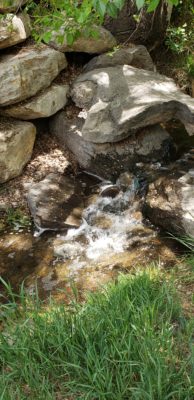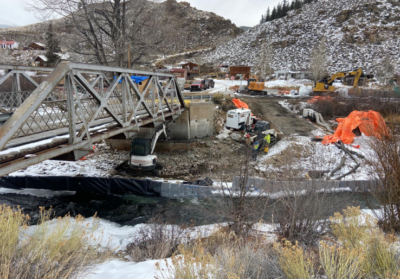House Speaker Julie McCluskie on Wednesday introduced legislation to restore critical protections for Colorado’s streams, rivers, and wetlands. HB24-1379 is also sponsored by Senator Dylan Roberts and Representative Karen McCormick.
“This Colorado approach to protecting our streams, rivers, and wetlands will provide certainty to communities, sustain our water quality, and ensure future generations can enjoy the great Colorado outdoors we all love,” said Speaker Julie McCluskie (D-Dillon).
“Clean water is our most precious resource on the Western Slope–necessary for everything from our booming outdoor recreation economy and agriculture industry to high country breweries, ski resorts, and increasing household demand,” she added. “I’m proud Colorado is stepping up to secure our water future after the Supreme Court removed important protections and left our waterways in jeopardy.”
“Protecting Colorado’s threatened water supply is a key priority for the communities I represent on the Western Slope, and is far too important to be left in limbo, which is why we’re taking action now,” said Senator Dylan Roberts (D-Frisco). “This critical bill will help us protect our precious water resources while appropriately balancing the agricultural and community needs in our state.”
The governor’s office added their endorsement of the proposed legislation, “Water is a precious resource and is critical to our economy and way of life. I am committed to protecting Colorado’s water today and building a more water-efficient, sustainable, and resilient future. Today, we further our commitment to protect Colorado’s water for the next generation of Coloradans,” said Governor Jared Polis.

Water bubbling in the ditch aside the Monarch Spur Trail, adjacent to Salida SteamPlant complex. Photo by Merrell Bergin
The Clean Water Act authorizes the Environmental Protection Agency (EPA) to define waterways of the United States and the Army Corps of Engineers to regulate discharges from dredge and fill activities into waters that meet that definition. The May 2023 U.S. Supreme Court decision in Sackett v. EPA redefined what constitutes waters subject to federal regulation and placed an estimated 60 percent of Colorado wetlands at risk of losing protections.
“Protecting our vital freshwater resources is one of the most important things we can do as Colorado lawmakers,” said Rep. Karen McCormick (D-Longmont). “Everyone from our farmers and ranchers to the native plants and animals that call Colorado home, rely upon our rivers, streams, and wetlands. This important legislation provides certainty and clarity for businesses and landowners while protecting Colorado’s watersheds–securing our water future for generations to come.”
The legislation introduced this week would protect Colorado waters that are now not federally protected. The permitting framework is based on well-established approaches already used by the Army Corps of Engineers and will provide clarity on when a permit is needed. Normal farming and ranching activities, such as plowing, farm road construction, and erosion control practices would not require a permit.
“As demands on water resources increase, and the impacts of climate change become more pronounced, Colorado will be wise to step up its efforts in wetland preservation,” said fourth-generation Yuma County farmer Gregory Hill. “Speaker McCluskie and Senator Roberts are stepping up where the courts have left off. I applaud their leadership to fill in the gap in regulation left by the Supreme Court and to regulate and preserve our wetlands and all the benefits provided by them.
Until the recent decision, the Army Corps’ permitting program safeguarded the vast majority of Colorado’s state waters from pollution caused by dredge and fill activities. Dredge and fill activities involve digging up or placing dirt and other fill material into wetlands or surface waters as part of construction projects.

Work on the Granite Bridge is proceeding on schedule. This image shows the Scour curtain pressing operation. Courtesy image.
These operations are necessary in many infrastructure projects including roads, bridges, housing developments, flood mitigation, and utility pipelines. The legislation provides a way for these projects to move forward and at the same time protect Colorado’s water resources.
“As the owner of a brewery in a resort town, I depend on cold, clean water to craft award-winning beers. Clean water allows me to run my business, create jobs, and contribute sales tax revenue for my community,” said Winter Park-based Big Trout Brewing Company Co-owner and Head Brewer Tom Caldwell.
“Our town depends on clean water for a multitude of tourist activities that bring people from all over the world,” he added. “We need to protect our waterways and wetlands. House Speaker Julie McCluskie and Senator Dylan Roberts’ bill is a needed remedy to a terrible decision by the U.S. Supreme Court.”
“The Supreme Court’s Sackett decision threatens my community’s water supply and resilience to climate change, especially those already living with disproportionate impacts of polluted water,” said Adams County Commissioner (District 4) Steve O’Dorsio. He also serves as a member of Governor Polis’ Waters of the United States (WOTUS) Task Force.
“I applaud Speaker McCluskie and Senator Roberts for introducing HB24-1379. This legislation creates regulatory certainty allowing for responsible development to occur in a manner that also protects the wetlands and streams which are critical to providing safe, affordable, drinking water for all.”









Recent Comments